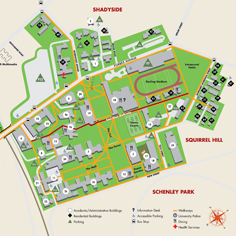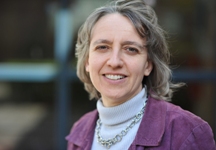

ICSC 2010
Fourth IEEE International Conference on Semantic ComputingSeptember 22-24, 2010
Carnegie Mellon University, Pittsburgh, PA, USA
The fourth IEEE International Conference on Semantic Computing (ICSC2010) continues to foster the growth of a new research community. The conference builds on the success of the past ICSC conferences as an international forum for researchers and practitioners to present research that advances the state of the art and practice of Semantic Computing, as well as identifying emerging research topics and defining the future of the field. The event is located in Pittsburgh, PA, on the campus of Carnegie Mellon University. The technical program of ICSC2010 includes workshops, invited keynotes, paper presentations, panel discussions, industrial “show and tells”, demonstrations, and more. Submissions of high-quality papers describing mature results or on-going work are invited.
The main goal of the conference is to foster the dialog between experts in each sub-discipline. Therefore we especially encourage submissions of work that is interesting to multiple areas, such as multimodal approaches.
Areas of interest include:
Semantics based Analysis
- Natural language processing
- Image and video analysis
- Audio and speech analysis
- Data and web mining
- Behavior of software, services and networks
- Security
- Analysis of social networks
Semantic Integration
- Metadata and other description languages
- Database schema integration
- Ontology integration
- Interoperability and service integration
- Semantic programming languages and software engineering
- Semantic system design and synthesis
Applications using Semantics
- Search engines and question answering
- Semantic web services
- Content-based multimedia retrieval and editing
- Context-aware networks of sensors, devices and applications
- Machine translation
- Music description
- Medicine and Biology
- GIS systems and architecture
Semantic Interfaces
- Natural language interfaces
- Multimodal interfaces
- Human centered computing
Download general CfP in pdf format
- Feb 22, 2010: Special Session Proposals
- Mar 22, 2010: Workshop Proposals
- May 17th, 2010: Regular Paper Submission (extended)
- May 17th, 2010: Demo Descriptions (extended)
- June 28th, 2010: Notification Date
- July 15th, 2010: Camera-Ready & Registration
Organizing Committee
General Co-Chairs
Jaime Carbonell, Carnegie Mellon University, USA
David A. Evans, JustSystems Evans Research, USA
Martha Palmer, University of Colorado, USA
Phillip Sheu, University of California, Irvine, USA
Conference Co-Chairs
Shu-Ching Chen, Florida International University, USA
Alexander Hauptmann, Carnegie Mellon University, USA
Craig Martell, Naval Postgraduate School, USA
Florian Metze, Carnegie Mellon University, USA
Program Co-Chairs
Ian Harris, University of California, Irvine, USA
Mei-Ling Shyu, University of Miami, USA
Program Vice Co-Chairs
Karin K. Breitman, PUC-Rio, Brazil
Lori Levin, Carnegie Mellon University, USA
Giovanni Pilato, Italian National Research Council, Italy
Bernt Wahl, University of California, Berkeley, USA
Industry Co-Chairs
Udo Bub, Deutsche Telekom Laboratories, Germany
Jennifer Lindo, Orbis Technologies, Inc., USA
Alexander Loui, Eastman Kodak, USA
Roberto Sicconi, IBM, USA
Monika Woszczyna, M*Modal, USA
Demo Co-Chairs
Radu Florian, IBM, USA
Anne Jude Hunt, Primal Fusion, USA
Robert Mertens, Fraunhofer IAIS, Germany
Joy Zhang, Carnegie Mellon University SV, USA
Workshop Co-Chairs
Christian Bauckhage, Fraunhofer IAIS, Germany
Asli Celikyilmaz, University of California, Berkeley, USA
Ian Oliver, Nokia, Finland
Balakrishnan Prabhakaran, University of Texas at Dallas, USA
Björn Schuller, Technische Universität München, Germany
Mark Wood, Eastman Kodak, USA
Summer School Co-Chairs
Gerald Friedland, ICSI Berkeley, USA
Elena Simperl, STI, Austria
Publicity Co-Chairs
Samuel A. Ajila, Carleton University, Canada
Rodrigo Capobianco Guido, University of Sao Paulo, Brazil
Angela Goh, Nanyang Technological University, Singapore
Iryna Gurevych, Darmstadt University of Technology, Germany
Ming (Mia) Mao, SAP Research, USA
David Ostrowski, Ford, USA
Ilja Radusch, TU Berlin, Germany
Jie Yang, NSF, USA
Chengcui Zhang, University of Alabama at Birmingham, USA
Publications Co-Chairs
Nadine Ludwig, Hasso-Plattner-Institut, Germany
Finance Chair
Taehyung Wang, California State University Northridge, USA
Web Chair
Chengjia Huo, University of California, Irvine, USA
Registration Co-Chairs
Qi Wang, University of California, Irvine, USA
Ke Hao, University of California, Irvine, USA
Current Workshops
International Workshop on Semantic Search Engines (SSE2010)
http://www.ieee-icsc.org/SSE2010/
International Workshop on Semantic Web And Reasoning for Cultural Heritage and Digital Libraries (SWARCH-DL)
http://swig.hpclab.ceid.upatras.gr/SWARCH-DL
The 2010 IEEE International Workshop on Semantic Computing and Multimedia Systems (IEEE-SCMS 2010)
http://www.cis.uab.edu/kddm/scms10/index.htm
Semantic Search Engines (SSE2010)
in conjunction with
Fourth IEEE International Conference on Semantic Computing
September 22-24, 2010
While traditional search technologies were designed based on textual data using a keyword search approach, we define a “Semantic Search Engine” (SSE) to be a search (including problem solving) engine of heterogeneous sources addressing computational content of all types, and is accessed by the user via a natural interface.
Authors are invited to submit original and research papers addressing technical issues, solutions and technologies related to Semantic Search Engines. All submissions will be peer-reviewed by members of an international program committee. It is expected that the proceedings of the workshop programs will be published together with the main conference proceedings by IEEE CS press.
Submission: Manuscripts must be sent to psheu@uci.edu by June 15. Regular Papers should be no longer than six (6) pages.
Organizers of the workshop include:
Gerald Friedland, ICSI, Berkeley
Arif Ghafoor, Purdue University
Atsushi Kitazawa, NEC, Japan
Sang-goo Lee, Seoul National University, Korea
Max Mühlhäuser, Darmstadt University, Germany
Raymond Paul, U.S. Department of Defense
Phillip Sheu, University of California, Irvine
Mei-Ling Shyu, University of Miami
Jaideep Shrivastava, University of Minnesota
Jeffrey Tsai, University of Illinois, Chicago
Hiroshi Yamaguchi, Chuo University, Japan
The conference will take place at the University Center of CMU – west of the stadium
Campus Map

Travel:
http://www.cmu.edu/about/visit/directions-parking.shtml
Pittsburgh Airport Flyer:
http://www.portauthority.org/PAAC/tabid/241/default.aspx
keynote
by Tony Hey,
Corporate Vice President of External Research, Microsoft Corporation
Abstract
Speaker Bio
Presentation Slide

keynote
by Shih-Fu Chang,
Digital Video and Multimedia Lab, Columbia University
Abstract
Speaker Bio
Presentation Slide

keynote
by Lynda Hardman,
Centrum Wiskunde & Informatica
Abstract
Speaker Bio
Presentation Slide

keynote
by Sanda Harabagiu,
University of Texas, Dallas
Abstract
Speaker Bio
Presentation Slide

Semantic Challenge
by Bhavani Thuraisingham,
University of Texas, Dallas
Abstract
Speaker Bio
Semantic Challenge
by Kevin D. Ashley,
University of Pittsburgh
Abstract
Speaker Bio
Presentation Slide
Semantic Challenge
by Roger B. Dannenberg,
Carnegie Mellon University
Abstract
Speaker Bio
Presentation Slide
Semantic Challenge
by Tom M. Mitchell,
Carnegie Mellon University
Abstract
Speaker Bio
Presentation Slide
Semantic Challenge
by Manuela Veloso,
Carnegie Mellon University
Abstract
Speaker Bio
Semantic Challenges
by Gregory Grefenstette,
Chief Science Officer of Exalead
Abstract
Speaker Bio
Presentation Slide
Semantic Challenge
by Rebecca Crowley,
University of Pittsburgh
Abstract
Speaker Bio
by Manuela M. Veloso,
Herbert A. Simon Professor
Computer Science Department
Carnegie Mellon University
In this talk, I will present our ongoing work on bringing mobile robots to coexist with humans. Although robotics research and development have significantly advanced in recent years, we still do not see frequently, if at all, robots moving around in our environments. I will discuss the challenges of indoor robots in particular, and point out their inevitable limitations at least for the near future. I will then present the symbiotic human-robot relationship approach that we are pursuing, in which humans, as present in indoor environments, can help and serve as a source of information and learning for robots. I will concretely talk about our CoBot robots, developed to be indoor service robots, and our humanoid NAO robots. The goal is to use the multiple types of knowledge available through the robots sensors, while processed at different semantic levels. I will show results and videos supporting our symbiotic approach.
back to keynotes
by Gregory Grefenstette,
Chief Science Officer of Exalead
End users to commercial applications need intuitively simple interfaces. How can we represent “semantics” without training them in knowledge representation? We will talk about how to make semantics usable without the user being aware of “semantics”, and the challenges this poses to the underlying knowledge representation system.
back to keynotes
by Tom M. Mitchell,
E. Fredkin University Professor and Department Head
Machine Learning Department
Carnegie Mellon University
How does the human brain represent meanings of words and pictures in terms of underlying neural activity? This talk will present our research using machine learning methods together with fMRI and MEG brain imaging to study this question. One line of our research has involved training classifiers that identify which word a person is thinking about, based on their observed neural activity. A second line involves training a computational model that predicts the neural activity associated with arbitrary English words, including words for which we do not yet have brain image data.
back to keynotes
by Sanda Harabagiu,
University of Texas, Dallas
Natural Language Processing (NLP) techniques employed in textual Question Answering (QA) rely on many forms of semantic information. Questions have a semantic focus and they convey an information need through a variety of semantic forms. On-line documents can be annotated with rich semantic structures to enable superior search for answers. Answers are validated by textual inference techniques that operate on knowledge encoding many semantic frameworks. In addition, semantic resources such as WordNet, FrameNet, PropBank, NomBank and TimeBank provide a multitude of semantic encodings useful for QA. Wikipedia allows researchers to mine for additional semantic information, in their quest to develop answer ranking and extraction methods.
During a decade of envisioning and developing QA systems, I ventured often on the path of exploring semantic information, either readily available or, mostly mined with NLP methods from large on-line text collections. Semantic information was selected on-demand, to serve several inference tasks required in the process of understanding a question, capturing the context in which it may be answered and pinpointing and justifying its answers.
back to keynotes
by Tony Hey,
Corporate Vice President of External Research, Microsoft Corporation
Science has undergone several revolutions - from experimental science, which focused on observations of natural phenomena, to theoretical science, which encapsulated these observations into laws of Nature, to computational science in the last 50 years, studying the simulation of complex phenomena. Now, as scientific data in almost every field is growing exponentially, the focus has moved to a fourth research paradigm for data-intensive science based on technologies and tools suitable for extracting knowledge from massive volumes of data. What comes next? And how can semantic computing contribute to it? In a knowledge-driven society the emergent ecosystem of software and services for research will require technologies enabling machine-based information management, analysis, reasoning, and inference. Products and tools from information industries are well underway to start delivering on the promise of semantic computing (e.g. visual search, semantic search). However, we need further investment in and wider deployment of semantics-based technologies, such as those demonstrated by research projects funded by the UK eScience and the NSF Cyber-enabled Discovery and Innovation programs, and which can now scale up to web-scale via the emergent cloud computing infrastructure.
back to keynotes
by Kevin D. Ashley
University of Pittsburgh
This talk will briefly consider the intersection of semantic computing with law, legal reasoning, and legal practice. Based on the definition of semantic computing in the materials for the fourth IEEE International Conference on Semantic Computing (ICSC2010), the intersection of semantic computing with law, legal reasoning, and legal practice addresses the derivation and matching of the semantics of computational content to that of naturally expressed user intentions relating to legal problem-solving or analysis in order to retrieve, manage, manipulate or create content based on its significance to the legal problem-solving or analysis, where "content" includes text, video, audio, services, networks, etc.
The talk will illustrate some challenges of addressing the pressing needs for new ways to relate the semantics of computational content to users’ intentions relating to legal problem-solving or analysis. The needs are inherent in many developments in high tech legal practice, e-government, and research in Artificial Intelligence and Law. For example:
- In evidentiary discovery, the need to process enormous numbers of electronic documents in terms of their meaning and significance relative to litigators’ intentions concerning clients’ legal claims and strategies
- In business compliance, the need to relate computationally-manipulable norms to regulators’ intentions embodied in the natural language legal codes the norms are meant to represent and implement and in the principles and policies underlying the regulations
- In legal information retrieval and modeling legal reasoning, the need to relate computationally-processable ontological representations of legal concepts and their meanings to the intentions of legal researchers and users in retrieving, comparing, and drawing inferences from relevant legal rules, cases, and commentaries
- In e-Commerce and semantic web-based legal services, the need to relate computationally-accessible resources to the intentions of electronically contracting parties
- In automated rights management of privacy and intellectual property rights in data, the need to relate proposed data access to the intentions of data rights owners and users
- In e-government and legal education, the need to relate computationally-processable argument diagrams and the meanings and intentions of legal arguers.
back to keynotes
E. Fredkin University Professor and Department Head
Machine Learning Department
Carnegie Mellon University
Tom M. Mitchell is the E. Fredkin University Professor and head of the Machine Learning Department at Carnegie Mellon University. His research interests lie in cognitive neuroscience, machine learning, natural language processing, and artificial intelligence. Mitchell is a member of the US National Academy of Engineering, a Fellow of the American Association for the Advancement of Science (AAAS), and Fellow and Past President of the Association for the Advancement of Artificial Intelligence (AAAI). Mitchell believes the field of machine learning will be the fastest growing branch of computer science during the 21st century. His home page is www.cs.cmu.edu/~tom
back to keynotes
University of Texas, Dallas
Sanda Harabagiu is Associate Professor and Erik Jonsson School Research Initiation Chair in the Computer Science Department of the University of Texas at Dallas. She is also the Director of the Human Language Technology Research Institute at the University of Texas at Dallas. Dr. Harabagiu has earned a PhD from University of Southern California in 1997 and a Doctorate from University of Rome Tor Vergata in 1994. She has been on the faculty of Southern Methodist University, University of Texas at Austin and University of Texas at Dallas. Her research spans Natural Language Processing, Information Retrieval, Knowledge Processing and Artificial Intelligence.
In her work, Dr. Harabagiu combines knowledge extracted from the World Wide Web with knowledge coerced from large lexical databases (e.g. WordNet or FrameNet) to be able to model the semantics of language in texts. In 2006 she co-edited a book entitled "Advances in Open Domain Question Answering". Dr. Harabagiu is a past recipient of an NSF CAREER award for studying reference resolution. Additional information is available from www.hlt.utdallas.edu/~sanda.
back to keynotes

Professor of Law and Intelligent Systems
University of Pittsburgh
Dr. Kevin Ashley holds interdisciplinary appointments as a faculty member of the Graduate Program in Intelligent Systems at the University of Pittsburgh, a Senior Scientist at the Learning Research and Development Center, a Professor of Law, and Adjunct Professor of Computer Science. He received a B.A. in philosophy (magna cum laude) from Princeton University in 1973, J.D. (cum laude) from Harvard Law School in 1976, and Ph.D. in computer science in 1988 from the University of Massachusetts.
An expert on computer modeling of legal reasoning and cyberspace legal issues, he has reported his research in conference proceedings of the American Association for Artificial Intelligence, the International Association for Artificial Intelligence and the Law, and the Cognitive Science Society. He has also published in journals such as Jurimetrics, IEEE Expert, International Journal of Man/Machine Studies, and Journal of Artificial Intelligence and the Law, of which he is an editor. Professor Ashley has been a Principal Investigator of a number of National Science Foundation grants to study reasoning with cases in law and professional ethics. Professor Ashley is also author of Modeling Legal Argument: Reasoning with Cases and Hypotheticals (MIT Press/Bradford Books, 1990).
A former National Science Foundation Presidential Young Investigator, Professor Ashley was also a visiting scientist at the IBM Thomas J. Watson Research Center, and a recipient of an IBM Graduate Research Fellowship. He is a Fellow of the American Association for Artificial Intelligence, and a past President of the International Association of Artificial Intelligence and Law.
back to keynotes
Professor
University of Texas, Dallas
Dr. Bhavani Thuraisingham is the Louis A. Beecherl, Jr. I Distinguished Professor in the Erik Jonsson School of Engineering and Computer Science at the University of Texas at Dallas (UTD) effective September 2010. She joined UTD in October 2004 as a Professor of Computer Science and Director of the Cyber Security Research Center which conducts research in data security and privacy, secure networks, secure languages, secure social media, data mining and semantic web. She is an elected Fellow of three prestigious organizations: the IEEE (Institute for Electrical and Electronics Engineers), the AAAS (American Association for the Advancement of Science) and the BCS (British Computer Society). She is the recipient of numerous awards including the IEEE Computer Society’s 1997 Technical Achievement Award for “outstanding and innovative contributions to secure data management” and the 2010 Research Leadership Award for Outstanding and Sustained Leadership Contributions to the field of Intelligence and Security Informatics” presented jointly by the IEEE Intelligent and Transportation Systems Society Technical Committee on Intelligence and Security Informatics in Transportation Systems and the IEEE Systems, Man and Cybernetics Society Technical Committee on Homeland Security. She served as served as an IEEE Distinguished Lecturer between 2002 and 2005. She was also quoted by Silicon India magazine as one of the seven leading technology innovators of South Asian origin in the USA in 2002.
back to keynotes
Chief Science Officer
Exalead
Gregory Grefenstette (BS Stanford’78, PhD Univ Pittsburgh’93) is currently Chief Science Officer of Exalead, an innovative search engine company, part of Dassault Systemes. One of the founders of the field of Cross Language Information retrieval, and an expert in natural language processing, he was formerly principal scientist at Xerox Research Centre Europe (1993-2001), Clairvoyance Corporation (2001-2004) and the French CEA. His current interests are in linked data and information retrieval in virtual reality.
back to keynotes
by Lynda Hardman
Centrum Wiskunde & Informatica
Many methods have been developed to extract human-interpretable semantics from signals present in individual media assets. Ensuring that these human-interpretable semantics are also machine processable allows us to identify, describe and connect together fragments of media assets in a rich information environment. Users requiring information are then faced with the problem of finding out what information is available, and obtaining sufficient fragments to successfully carry out their task. Systems supporting these tasks can use the fragments, descriptions of them and relationships among them, to improve both the selection and presentation of information.
This talk will address two issues. Where can semantics play a role in supporting information oriented tasks, and how can they be used to improve support.
back to keynotes
head of the Interactive Information Access group
at Centrum Wiskunde & Informatica
Lynda Hardman (http://www.cwi.nl/~lynda/) is head of the Interactive Information Access group at CWI (Centrum Wiskunde & Informatica) and professor by special appointment of Multimedia Interaction in the Faculty of Science at the University of Amsterdam. She obtained her PhD from the University of Amsterdam in 1998, having graduated in Mathematics and Physics from Glasgow University in 1982. During several years of working in the software industry she was the development manager for Guide - the first hypertext authoring system for personal computers (1986).
Her early experiences in industry with the development of hypertext authoring tools inspired her towards underlying questions of combining time-dependent documents (such as video sequences) along with interaction through links into a single model. She was a member of the W3C working group that developed the first SMIL recommendation.
Since the development of the semantic web, she has dedicated herself to improving human access to the ever-expanding 'linked data cloud'. Her current research efforts are focused on improving design methods for human-based interfaces in relation to developing technology.
She is a member of the editorial board for the Journal of Web Semantics, and the New Review of Hypermedia and Multimedia, and was co-programme chair for SAMT 2008 and ACM Hypertext 2003.
back to keynotes

Foto Jeroen Oerlemans
by Roger B. Dannenberg
School of Computer Science, Art, and Music
Carnegie Mellon University
Music understanding is the automatic recognition of pattern and structure in music. Music understanding problems include matching, searching, and parsing problems related to music recognition and music classification. Music semantics is a more difficult subject. Music, like abstract art, rarely denotes anything specific, and one can argue that music semantics is an oxymoron. Nevertheless, music can be associated with emotions and many other terms or tags, leading to representations similar to those used for semantic computation in other domains. We are at a time of music revolution where old practices of publishing and recording are being challenged by new technologies and consumer expectations. I believe this revolution will continue with the advance of music computation, which will enable new forms of music practice. Music understanding and semantic computing will play an important role in the future of music.
back to keynotes
Herbert A. Simon Professor
Computer Science Department
Carnegie Mellon University
Manuela M. Veloso is Herbert A. Simon Professor of Computer Science at Carnegie Mellon University. She directs the CORAL research laboratory, for the study of agents that Collaborate, Observe, Reason, Act, and Learn, www.cs.cmu.edu/~coral. Professor Veloso is a Fellow of the Association for the Advancement of Artificial Intelligence, and the President of the RoboCup Federation. She recently received the 2009 ACM/SIGART Autonomous Agents Research Award for her contributions to agents in uncertain and dynamic environments, including distributed robot localization and world modeling, strategy selection in multiagent systems in the presence of adversaries, and robot learning from demonstration. Professor Veloso is the author of one book on "Planning by Analogical Reasoning" and editor of several other books. She is also an author in over 200 journal articles and conference papers.
back to keynotes
Associate Professor
Biomedical Informatics at the University of Pittsburgh School of Medicine
Director of the Pittsburgh Graduate Training Program in Biomedical Informatics
Rebecca Crowley is an Associate Professor of Biomedical Informatics at the University of Pittsburgh School of Medicine and Director of the Pittsburgh Graduate Training Program in Biomedical Informatics. She received her MD and MS in Information Science from the University of Pittsburgh, and her post-graduate training in Pathology and Neuropathology at Stanford University. Dr. Crowley was a National Library of Medicine (NLM) Fellow in Biomedical Informatics, and a Howard Hughes Medical Institute Fellow in Molecular Neuroendocrinology. Her research interests include applications of semantic technologies to clinical teaching and translational biomedical research as well as the sociotechnical requirements and consequences of sharing biomedical data. Dr. Crowley has also contributed to several large scale biomedical data sharing consortia focused on semantic interoperability including the Cancer Biomedical Informatics Grid (caBIG).
back to keynotes
Associate Research Professor
School of Computer Science, Art, and Music
Carnegie Mellon University
Dr. Roger B. Dannenberg is an Associate Research Professor in the Schools of Computer Science, Art, and Music at Carnegie Mellon University, where he is also a fellow of the Studio for Creative Inquiry. Dannenberg is well known for his computer music research, especially in real-time interactive systems. His pioneering work in computer accompaniment led to three patents and the SmartMusic system now used by tens of thousands of music students. He also played a central role in the development of the Piano Tutor, an intelligent, interactive, automated multimedia tutor that enables a student to obtain first-year piano proficiency in less than 20 hours. Dannenberg held a patent for large-scale interactive games controlled by crowd noise, and these "stadium games" have entertained many NFL fans. Other innovations include the application of machine learning to music style classification and the automation of music structure analysis. As a trumpet player, he has performed in concert halls ranging from the historic Apollo Theater in Harlem to the Espace de Projection at IRCAM, and he is active in performing jazz, classical, and new works. His compositions have been performed by the Pittsburgh New Music Ensemble, the Pittsburgh Symphony, and at festivals such as the Foro de Musica Nueva, Callejon del Ruido, Spring in Havana, and the International Computer Music Conference.
back to keynotes
Corporate Vice President of External Research
Microsoft Corporation
As corporate vice president in Microsoft Research, Tony Hey is responsible for worldwide university research collaborations with Microsoft researchers. Hey is also responsible the multidisciplinary eScience Research Group within Microsoft Research. Before joining Microsoft, Hey served as director of the U.K.'s e-Science Initiative, managing the government's efforts to build a new scientific infrastructure for collaborative, multidisciplinary, data-intensive research projects. Before leading this initiative, Hey led a research group in the area of parallel computing and was Head of the School of Electronics and Computer Science, and Dean of Engineering and Applied Science at the University of Southampton.
back to keynotes

Professor,
Digital Video and Multimedia Lab
Columbia University
Shih-Fu Chang is Director of Digital Video and Multimedia Lab and Professor and Chairman of Electrical Engineering and at Columbia University. He has also led the ADVENT research consortium at Columbia University with the participation of more than 25 industry sponsors. He has made significant contributions in multimedia search, media forensics, mobile media adaptation, and international standards. He has been recognized with several awards, including IEEE Kiyo Tomiyasu Technical Field Award, IBM Faculty Award, Navy ONR Young Investigator Award, ACM Recognition of Service Award, and NSF CAREER Award. He and his students have received four Best Paper Awards and seven Best Student Paper Awards from IEEE, ACM, and SPIE. Many video indexing technologies developed by his group have been licensed to companies. He was elected to IEEE Fellow in 2004 and was Editor-in-Chief for IEEE Signal Processing Magazine during 2006-8.
back to keynotes

by Prof. Shih-Fu Chang
Digital Video and Multimedia Lab, Columbia University
With the explosive growth of multimedia content online, researchers have been racing to develop novel solutions for searching images and videos. The Holy Grail has always been a seamless way of accessing multimedia information at the semantic level. However, two major barriers remain in the way – the semantic gap and the intention gap. The former refers to the large difference between machine recognizable information from raw image data and the user desired descriptions at the semantic level. To address this, recently there have been major efforts in developing multimedia ontologies for describing visual concepts, training large resources for automatic concept categorization, and new image search interfaces directly in the visual concept space. The other challenge associated with the intention gap lies in the difficulty in expressing user search targets through the conventional keyword-based methods. In response to this, I will describe two new paradigms. One explores efficient methods (lexical, statistical, and Web) to map keywords to visual detectors and adds real-time interfaces for manipulating queries in the visual concept space. The other completely foregoes the textual query input, instead relies on novel brain machine interfaces and data mining techniques to decode user’s search targets. I will survey on-going research in the above directions aiming towards a semantic-level visual search engine.
back to keynotes
ICSC 2010 Industry Session Call for Papers
Program Goals and Format:
The goals of the ICSC 2010 Industry Session are to foster exchanges between practitioners and the academics, to promote novel solutions to today's challenges in the area of Semantic Computing and applications, to provide practitioners in the field an early opportunity to evaluate leading-edge research, and to identify new issues and directions for future research and development efforts. Similar to regular papers, the papers in the industry session will undergo a review process and will appear in the conference proceedings. However, the selection criteria for industry papers are slightly different. In particular, papers should describe technologies, methodologies, applications, prototypes or experiences of clear industry relevance. A main goal of this session is to present research work that exposes the academic and research communities to challenges and issues important for the industry. Therefore, the papers in this session will be evaluated primarily by the novelty and applicability of the insights from its industrial solutions, instead of the originality of its algorithmic content.
Topics of Interest:
Topics of particular interest include but are not limited to those identified in the main conference CFP, as well as those listed below:
1. Development of new semantic systems, architecture, and standards
2. Employment of smenatic computing tools and interfaces
3. Employment of large scale semantic systems
4. Benchmarking and performance evalaution of semnatic systems
5. Innovative solutions for performance optimization
6. Mobile semantic systems and services
7. Multimedia semantic content analysis and retrieval systems
8. Modeling issues and case studies of semnatic computing
9. Game and entertainment applications
10. e-Business and other applications
11. Analysis of industry-specific trends and challenges
Important Dates:
May 17th, 2010: Submission of papers (extended)
TBA (same as main conference): Notification of acceptance
TBA (same as main conference): Camera-Ready copy of accepted papers due
Industrial Paper Submission:
Industrial papers should be submitted via the ICSC 2010 online paper submission system. For easy identification, all industrial papers should have as their title "Industry Track: rest of title." Industry Session papers should be no longer than 8 pages with the same submission guidelines available on the ICSC 2010 web page. Only electronic submission will be accepted. All industrial papers will be peer-reviewed and published in the conference proceedings, which will be published by the IEEE Computer Society Press. Submissions must not be published or submitted for another conference.
Industry Session Co-Chairs:
Udo Bub, Deutsche Telekom Laboratories, Germany
Jennifer Lindo, Orbis Technologies, Inc., USA
Alexander Loui, Eastman Kodak Company, USA
Roberto Sicconi, IBM, USA
Monika Woszczyna, M*Modal, USA
Sören Auer, University of Leipzig, Germany
Agnese Augello, University of Palermo, Italy
Ramazan Aygun, University of Alabama, Huntsville, USA
Kathy Baker, US Government, USA
Srinivas Bangalore, AT&T Research, USA
Stephen Beale, University of Maryland Baltimore (UMBC), USA
Michael Bloodgood, Johns Hopkins University, USA
Joel Booth, University of Illinois at Chicago, USA
Nicoletta Calzolari, Istituto di Linguistica Computazionale del CNR, Italy
Marco Casassa Mont, HP Laboratories, Bristol, UK
Kasturi Chatterjee, Florida International University, USA
Matt Cooper, FXPAL, USA
Jason Corso, SUNY at Buffalo, USA
Alfredo Cuzzocrea, Italian National Research Council, Italy
Barbara Di Eugenio, University of Illinois at Chicago, USA
Nicola Fanizzi, Universita 'di Bari, Italy
David Farwell, Universitat Polytecnica de Catalunya (UPC), Spain
Margaret Fleck, University of Illinois at Urbana-Champaign, USA
Stefania Galizia, INNOVA S.p.A., Italy
William I. Grosky, University of Michigan-Dearborn, USA
Yuanbo Guo, Microsoft, USA
Brian Harrington, Keble College, Oxford
Melanie Hartmann, Darmstadt University of Technology, Germany
Takako Hashimoto, Chiba University of Commerce 1-3-1, Japan
Johannes Heinecke, FT/IMG/RD/TECH/ACTS/FAST, France
Stacie Hibino, Eastman Kodak Company, USA
Graeme Hirst, University of Toronto, Canada
Ed Hovy, University of Southern California, USA
Eero Hyvönen, Aalto University and University of Helsinki, Finland
Maria Jose Ibanez, University of Zaragoza, Spain
Carsten Jacob, TU Berlin / Fraunhofer FOKUS, Germany
Hasan Jamil, Wayne State University, USA
Cliff Joslyn, PNNL, USA
Artem Katasonov, VTT Technical Research Centre of Finland, Finland
Tracy Holloway King, Microsoft, USA
Leonid Kof, Technische Universitat Munich, Germany
Reto Krummenacher, University of Innsbruck, Austria
Martha Larson, University of Delft, Netherlands
Freddy Lecue, University of Manchester, UK
Ying Li, IBM T.J. Watson, USA
Lin Lin, University of Miami, USA
Alexander Loui, Eastman Kodak Company, USA
Rabinarayan Mahapatra, Texas A&M, USA
Stephane Marchand-Maillet, University of Geneva, Switzerland
Lluís Màrquez, Universitat Politècnica de Catalunya, Spain
Dennis McLeod, University of Southern California, USA
Marge McShane, University of Maryland Baltimore (UMBC), USA
Farid Meziane, University of Salford, UK
Adrian Mocan, SAP AG, Germany
Shinichi Nagano, Toshiba Corporation, Japan
Costanza Navarretta, Center for Sprogteknologi, Denmark
Sergei Nirenburg, University of Maryland Baltimore (UMBC), USA
Jyotishman Pathak, Mayo Clinic, USA
Carlos Pedrinaci, The Open University, UK
Nick Pendar, Uptake Networks, USA
Christine Piatko, Johns Hopkins University, USA
Antonio Picariello, Universita` di Napoli "Federico II", Italy
Matthew Purver, Stanford University, USA
James Pustejovsky, Brandeis University, USA
Ellen Riloff, University of Utah, USA
William Schuler, University of Minnesota, USA
Alkis Simitsis, HP, USA
Heiko Stoermer, University of Trento, Italy
Ioan Toma, University of Innsbruck, Austria
Thanh Duc Tran, Karlsruher Institut für Technologie (KIT), Germany
Clare Voss, Army Research Lab, USA
Marilyn Walker, University of California at Santa Cruz (UCSC), USA
Yorick Wilks, University of Sheffield, UK
Theresa Wilson, University of Edinburgh, UK
Rene Witte, Concordia University, Canada
Jack Xie, Yahoo!, USA
Rong Yan, Facebook, USA
Ziming Zhuang, Yahoo! Labs, USA
Roger Zimmermann, National University of Singapore
Reservations must be made via phone to ensure the group rate – mention “ICSC 2010 – CMU,” unless otherwise specified.*
|
|
Wyndham Hotel - University Place 3454 Forbes Ave Pittsburgh, PA 15213 Phone: 412. 683.2040 Fax: 412.683.3934 Hotel SiteLink |
|
Room rate per night: $122 Deadline: Sunday, August 22, 2010 |
|
|
Residence Inn by Marriott 3896 Bigelow Boulevard Pittsburgh, PA 15213 Phone: 412-621-2200 Fax: 412-621-0955 Hotel Site Link |
|
|
Room rate per night: $124 Deadline: Tuesday, August 31, 2010 |
|
|
|
Courtyard by Marriott Shadyside/Oakland 5308 Liberty Avenue Pittsburgh, PA 15224 Phone: 412.683.3113 Fax: 412.992-5077 Hotel SiteLink |
|
Room rate per night: $149 Deadline: Tuesday, August 24, 2010 |
|
|
Springhill Suites by Marriott Bakery Square 134 Bakery Square Drive Pittsburgh, PA 15206 Phone: 412.362.8600 Fax: 412.362.8601 Hotel Site Link |
|
|
Room rate per night: $114 Deadline: Tuesday, August 31, 2010 |
|
|
|
Shadyside Inn 5405 Fifth Avenue Pittsburgh, PA 15232 Phone: 800-767-8483 Hotel SiteLink |
|
Room rate per night: $99 Studio/ $139 One-bedroom Deadline: Tuesday, August 31, 2010 * Mention code: 6847CM |
http://www.cmu.edu/about/visit/accommodations.shtml
Call for Demonstration Proposals for ICSC2010
IEEE ICSC 2010: The Fourth IEEE International Conference
on Semantic Computing, Pittsburg, PA, USA
September 22-24, 2010
http://www.ieee-icsc.org/
The IEEE ICSC 2010 organizing committee invites proposals for demonstrations to be given at the conference. The demonstrations provide a forum for researchers as well as industry participants to demonstrate working systems, applications, tools or showcases of base technologies to the conference atteendees. The goal of the demonstrations is to show a spectrum ranging from research prototypes to pilots developed and even products that use semantic technology and provide functionality based on semantics in the context of semantic computing. For submissions to this event, it is very important to describe the demonstration setup, functionality and benefit to the viewer of the demonstration. Technical background discussion can be presented at the actual demonstration or can be submitted as an industry track or regular conference paper; the focus of the demonstration themselves should be to show the functionality to viewers. It is expected that the demonstrations are highly interactive.
Topics for demonstrations include but are not limited to:
* Content and Information Management
* Knowledge Engineering
* Data Mining
* Semantic Database Theory and Systems
* Service-oriented Architectures and Computing
* Semantic Web and Semantic Web Services
* Multimedia Semantics
* Audio and Speech Processing
* Natural Language Processing
* Semantic Search Technologies and Applications
* User Interfaces
Demonstrations are ideally demonstrating a system or application that clearly shows the benefit of using and deploying semantics and semantic technologies. In addition, tools and base technologies that implement or use semantic technology or semantic approaches are invited for demonstration.
Demonstration Setup
The demonstrations are planned to be a single event during a conference reception function, open to all conference attendees, with the goal of open and constructive discussions. One table will be provided with power as well as an Internet connection. Posters can be put up behind or next to the tables (depending on the space) either on pin boards or the wall. Demonstrators must bring any additional equipment they require as no equipment will be provided by the conference.
Demonstration Submissions
Authors submitting papers to the demonstrations must submit a 2-page paper that clearly outlines the demonstration that will be set up and the functionality a visitor to the demonstration can observe. The technical background, such as the architecture or algorithms, should not be described in detail; such a description would be better submitted to the industry track or main conference paper track. Including links to supporting material, e.g. a video on the web or a web-based demo itself, is highly encouraged. All submissions must be in double-column IEEE format and follow the specific submission guidelines on the ICSC2010 web page. The Conference Proceedings will be published by the IEEE Computer Society Press and the accepted demonstration submissions will be included in the conference proceedings.
Important Dates
Demo Submission: May 17th, 2010 (extended)
Notification: June 21st, 2010
Camera Ready: tbd
Conference: September 22nd -24th, 2010
Submissions
Researchers and practitioners are invited to submit demo proposals to the demo co-chairs:
Radu Florian, IBM, USA
Anne Jude Hunt, Primal Fusion, USA
Robert Mertens, Fraunhofer IAIS, Germany
Joy Zhang, Carnegie Mellon University SV, USA
at
icscdemo@gmail.com
no later than May 17th, 2010.
1. Every demo paper accepted for publication in the Proceedings of ICSC 2010 MUST be presented during the conference.
2. Every demo paper accepted for ICSC 2010 MUST have attached to it at least one registration at the full member/nonmember rate. Thus, for a paper for which all authors are students, one student author will be required to register at the full registration rate.
Call for Applications
2nd International Summer School on Semantic Computing
July 25-31, 2010
University of California, Berkeley
co-sponsored by IEEE, Institute of Semantic Computing and STI International
Semantic Computing is currently emerging as a new field that integrates methods from multimedia (computer vision, speech processing), natural language processing, semantic web and ontology engineering, software engineering, and other fields with the goal of creating new applications that connect intuitively formulated user-intentions with the content of data.
The summer school will provide an introduction to the field to senior undergraduate and graduate students. A mix of young and well-established researchers and educators will present recent research results, as for example presented in the IEEE conferences on Semantic Computing. The tutorials will be complemented by keynote talks by renowned experts in the areas of Semantic Technologies, Ontologies, Multimedia or Natural Language Processing.
The 6-day event is taking place on the campus of the University of California, Berkeley and the curriculum will include the following topics:
- Formal Semantics
- Semantic Web
- Ontology Engineering
- Multimedia
- Natural Language Processing
Important Dates:
* May, 1: Application deadline
* May, 15: Notification of acceptance/Registration opens
* June, 15: Registration completed
* July, 25: School starts
For instruction on how to apply and other information, please
visit the following website: http://sssc2010.org
Technical Paper Preparation Instructions
Manuscripts must be written in English and follow the instructions in the Manuscript Formatting and Templates page
Document templates are located at:
Regular Papers should be no longer than eight (8) pages, Demo papers should no longer than two (2) pages.
All paper submissions will be carefully reviewed by at least three experts and reviews will be returned to the author(s) with comments to ensure the high quality of the accepted papers. The authors of accepted papers must guarantee that their paper will be presented at the conference. Please only submit original material where copyright of all parts is owned by the authors declared and which is not currently under review elsewhere. Please see the IEEE policies for further information.
Technical Paper Submission Instructions
Only electronic submission will be accepted. Technical paper authors MUST submit their manuscripts through EasyChair. Please follow this link (please register if not an EasyChair user). Manuscripts may only be submitted in PDF format.
A copyright form needs to be submitted upon acceptance of the paper and is not required at this stage.
1. Every paper accepted for publication in the Proceedings of ICSC 2010 MUST be presented during the conference.
2. Every paper accepted for ICSC 2010 MUST have attached to it at least one registration at the full member/nonmember rate. Thus, for a paper for which all authors are students, one student author will be required to register at the full registration rate.
Please download the registration form here.
FAX or mail your form with check to the following address:
Registration Chair:
Qi Wang c/o Prof. Phillip Sheu
FAX: +1 949/824-2228 (new number)
Department of EECS
University of California, Irvine
Irvine, CA 92697
USA
Email any question regarding registration to Qi Wang at qiw@uci.edu
ICSC2010 Author Kit Link
Important Date:
- July 15, 2010: Deadline for Camera-ready and Copyright Form Submissions
© IEEE-ICSC 2010